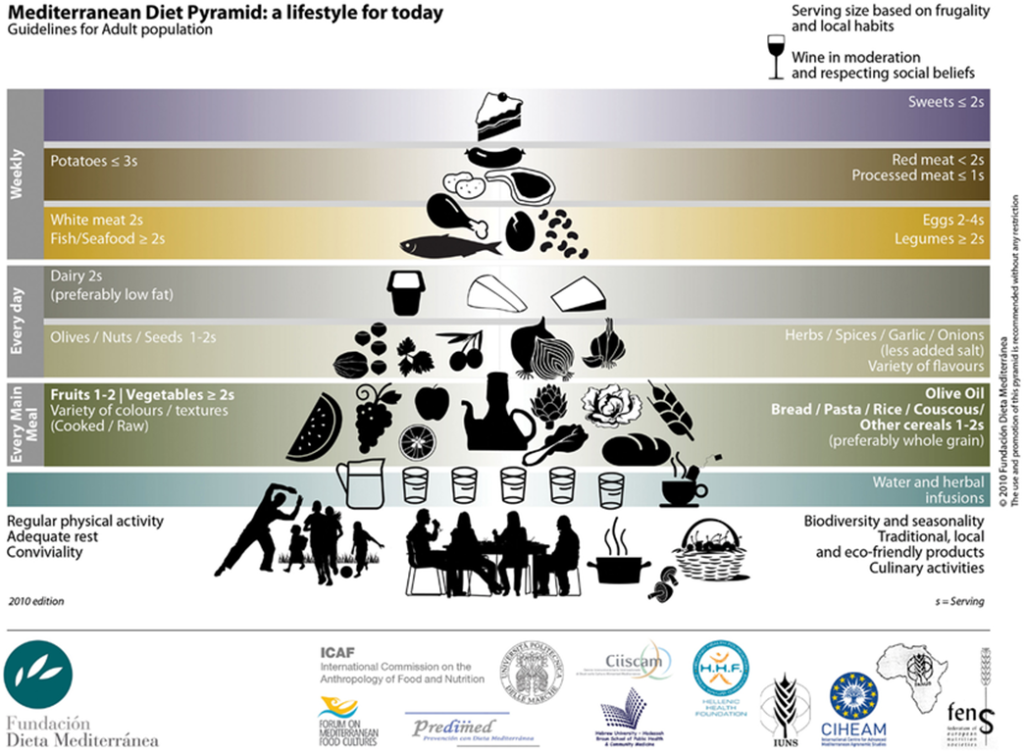The Quick Takeaway
- The Mediterranean Diet (Med Diet) is a way of life comprising an eating plan, home cooking, regular physical activity, seasonality, frugal serving sizes, wine in moderation and eating together around a table.
- The eating plan emphasises a variety of vegetables and fruits, olive oil as the principal source of fat, low to moderate consumption of cheese, yogurt, fish and poultry, and infrequent consumption of red meat.
- Data collected from populations where the Med Diet was followed suggests healthier outcomes compared to a traditional western diet, particularly for cardiovascular disease.
- In Finland where a big public health campaign encouraged a reduction in saturated fat and an eating plan inspired by the Med Diet there was a marked decrease in cardiovascular disease mortality.
- The impact of diet can also be studied through interventions. The PREDIMED study found that compared to a low-fat diet, the Med Diet reduced the number of cardiovascular incidents in the trial population.
- The Lyon Heart Study similarly found that the Med Diet reduced cardiovascular events compared to participants following a prudent western diet.
- Diet is difficult to study, particularly ensuring that participants follow an allotted diet for a long period of time, controlling for other variables such as physical activity, measuring health outcomes and eliminating sources of bias.
- There is a lot of evidence to support the health benefits of the Med Diet. Nevertheless, some well-regarded reviewers are cautious supporting only modest benefits for the Med Diet in the primary prevention of cardiovascular disease.
- In addition to benefits in the prevention of cardiovascular disease and incidents, there is evidence to support the benefits of the Med Diet on BMI, adiposity, the development of type 2 diabetes, and the development and treatment of some cancers.
- The Med Diet has been shown to have a positive effect on lipid profile, glycaemic profile and blood pressure with having any adverse effects. Metabolically the beneficial effects of the Med Diet are achieved through factors relating to inflammation and insulin resistance.
- There are other diets that are similar in content to the Med Diet that are supported by evidence of health benefits.
- The Dietary Approaches to Stop Hypertension (DASH) diet recommends low-fat dairy and vegetable oils, but does not specify olive oil. There is evidence that it reduces blood pressure in patients with hypertension and that it reduces the incidence of cardiovascular disease.
- Plant based diets may be healthy provided vegetarians and vegans eat a wide range of fruit and vegetables. There is evidence that following a plant-based diet reduces the incidence of cardiovascular disease and cancer, but the results of studies can be difficult to interpret as followers of these diets may also adopt other healthy lifestyle behaviours.
- There is no evidence that either the DASH diet or plant-based diets are better for health than the Med Diet.

The full deal
Public health and nutrition advice often references the Mediterranean Diet (Med Diet), as a diet plan for a healthy and long life. Talk of the Med Diet conjures up images of healthy old people sitting at rustic tables in the sunshine eating local produce, olives, salad and fruit, and drinking red wine. This is probably the right image of the Med Diet because it is more a way of life than a diet sheet. This chapter will consider how and why the Med Diet came to prominence together with the evidence of its health benefits.
To continue reading access the file or download the pdf.